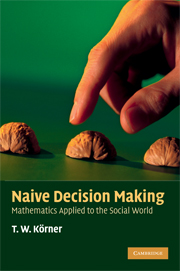Book contents
- Frontmatter
- Contents
- Introduction
- 1 A day at the races
- 2 The long run
- 3 The vice of gambling and the virtue of insurance
- 4 Passing the time
- 5 A pack of cards
- 6 Other people
- 7 Simple games
- 8 Points of agreement
- 9 Long duels
- 10 A night at the casino
- 11 Prophecy
- 12 Final reflections
- Appendix A The logarithm
- Appendix B Cardano
- Appendix C Huygens's problems
- Appendix D Hints on pronunciation
- Bibliography
- Index
Appendix C - Huygens's problems
Published online by Cambridge University Press: 06 July 2010
- Frontmatter
- Contents
- Introduction
- 1 A day at the races
- 2 The long run
- 3 The vice of gambling and the virtue of insurance
- 4 Passing the time
- 5 A pack of cards
- 6 Other people
- 7 Simple games
- 8 Points of agreement
- 9 Long duels
- 10 A night at the casino
- 11 Prophecy
- 12 Final reflections
- Appendix A The logarithm
- Appendix B Cardano
- Appendix C Huygens's problems
- Appendix D Hints on pronunciation
- Bibliography
- Index
Summary
Lancelot Hogben's Mathematics for the Million is such an excellent introduction to mathematics that mathematicians have forgiven him his evident dislike of their profession. However, like many authors (including the present one), he finds it hard to distinguish between what ought to have been true and what actually happened.
Here is his account of the ‘unsavoury origin’ of probability.
The first impetus came from a situation in which the dissolute nobility of France were competing in a race to ruin at the gambling tables. An algebraic calculus of probability takes its origin from a correspondence between Pascal and Fermat (about AD 1654) over the fortunes and misfortunes of the Chevalier de Méré, a great gambler and by that token très bon esprit, but alas (wrote Pascal) il n'est pas géomètre. Alas indeed! The Chevalier had made his pile by always betting small favourable odds, on getting at least one six in four tosses of a die and then lost it by always betting small odds on getting at least one double six in 24 double tosses.
Exercise C.1(i) Find the probability of getting at least one six in four tosses of a die and check that it is, indeed, greater than 1/2. Do you think it would be easy to make a fortune by betting even odds on getting at least one six in four tosses of a die?
- Type
- Chapter
- Information
- Naive Decision MakingMathematics Applied to the Social World, pp. 358 - 363Publisher: Cambridge University PressPrint publication year: 2008



